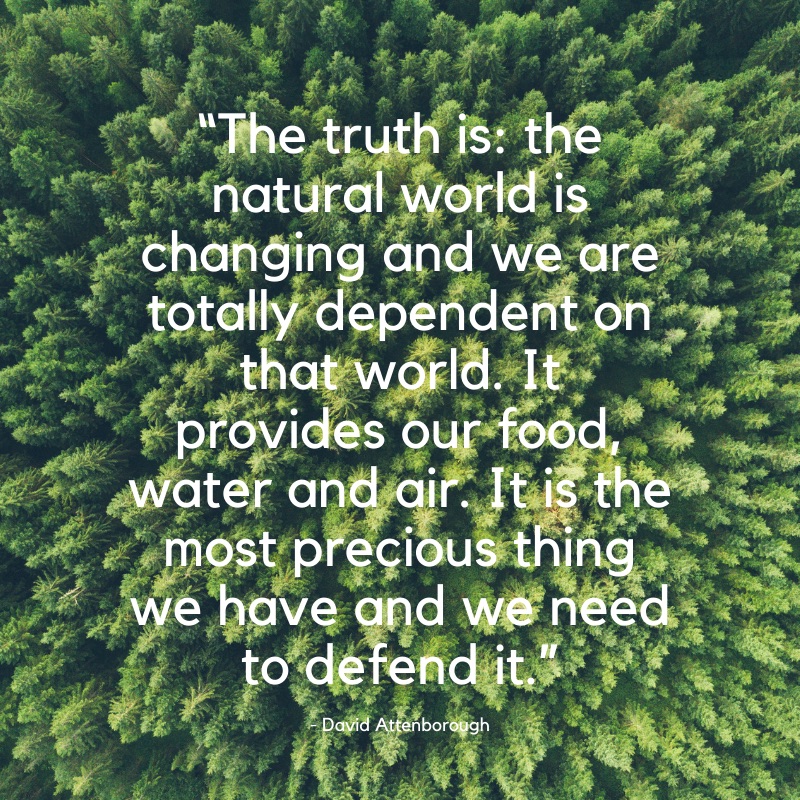Have you watched David Attenborough’s A Life On Our Planet yet? It is a powerful message to the world by one of the most treasured natural historians of our time.

Have you watched David Attenborough’s A Life On Our Planet yet? It is a powerful message to the world by one of the most treasured natural historians of our time.

Guided by the journals she’s kept since fifteen, and brimming with her humour and humanity, Open Book by Jessica Simpson is as inspiring as it is entertaining.

2020 has been a year like no other. Not only is the world suffering a deadly pandemic, racial tensions have been heightened, the environment continues to suffer and political leaders are vying for votes. Yikes. On reflection, it certainly has been a huge year.
Looking forward, we can take the lessons learned from 2020 and apply them into the future. It’s this thought that prompted us to look at lessons that have been learned from events that have happened in the past. We’ve found six great books that do just that. Sit back and get ready to be taken on a wild history ride.
What Happened by Hillary Clinton
‘In the past, for reasons I try to explain, I’ve often felt I had to be careful in public, like I was up on a wire without a net. Now I’m letting my guard down.’ – Hillary Rodham Clinton.
For the first time, Hillary Rodham Clinton reveals what she was thinking and feeling during one of the most controversial and unpredictable presidential elections in history. Now free from the constraints of running, Hillary takes you inside the intense personal experience of becoming the first woman nominated for president by a major party in an election marked by rage, sexism, exhilarating highs and infuriating lows, stranger-than-fiction twists, Russian interference and an opponent who broke all the rules. This is her most personal memoir yet. In these pages, she describes what it was like to run against Donald Trump, the mistakes she made, how she has coped with a shocking and devastating loss, and how she found the strength to pick herself back up afterwards. With humour and candour, she tells readers what it took to get back on her feet – the rituals, relationships and reading that got her through, and what the experience has taught her about life. She speaks about the challenges of being a strong woman in the public eye, the criticism over her voice, age and appearance, and the double standard confronting women in politics. She lays out how the 2016 election was marked by an unprecedented assault on democracy by a foreign adversary. By analysing the evidence and connecting the dots, Hillary shows just how dangerous the forces are that shaped the outcome, and why Americans need to understand them to protect their values and democracy in the future. The election of 2016 was unprecedented and historic. What Happened is the story of that campaign and its aftermath – both a deeply intimate account and a cautionary tale.
21 Lessons for the 21st Century by Yuval Noah Harari
We’ve highlighted this book on the blog before and believe it is important to include again. The Guardian newspaper credits Yuval Noah Harari with making serious non-fiction cool again. In his earlier books, the surprise bestsellers Sapiens and Homo Deus, he explained the history of humanity and the rise of civilisation in terms of evolutionary psychology. Now Yuval Noah Harari looks at the present. 21 Lessons for the 21st Century is a collection of essays about the big issues – AI and automation, Fake News and populism, religion, climate change – and how we can manage their impact on our lives. His talent at combining unexpected ideas into dazzling observations makes this a thought-provoking yet accessible read that helps us make sense of these uncertain times.
The Anarchy by William Dalrymple and Sid Sagar
In August 1765 the East India Company defeated and captured the young Mughal emperor and forced him to set up in his richest provinces a new government run by English traders who collected taxes through means of a vast and ruthless private army.
The creation of this new government marked the moment that the East India Company ceased to be a conventional international trading corporation, dealing in silks and spices, and became something much more unusual: an aggressive colonial power in the guise of a multinational business. In less than half a century it had trained up a private security force of around 260,000 men, twice the size of the British army, and had subdued an entire subcontinent, conquering first Bengal and finally, in 1803, the Mughal capital of Delhi itself. The Company’s reach stretched relentlessly until almost all of India south of the Himalayas was effectively ruled from a boardroom in London.
The Anarchy tells the remarkable story of how one of the world’s most magnificent empires disintegrated and came to be replaced by a dangerously unregulated private company, based thousands of miles overseas and answerable only to its shareholders. In his most ambitious and riveting book to date, William Dalrymple tells the story of the East India Company as it has never been told before, unfolding a timely cautionary tale of the first global corporate power.
Three hundred and fifteen years after its founding, with a corporate Mogul now sitting in the White House, the story of the East India Company has never been more current.
How Democracies Die by Steven Levitsky and Daniel Ziblatt
Democracies can die with a coup d’etat or they can die slowly. This happens most deceptively when in piecemeal fashion, with the election of an authoritarian leader, the abuse of governmental power and the complete repression of opposition. All three steps are being taken around the world and we must all understand how we can stop them. From the rule of General Augusto Pinochet in Chile to the quiet undermining of Turkey’s constitutional system by President Recip Erdogan, Harvard professors Steven Levitsky and Daniel Ziblatt draw insightful lessons from history to shine a light on regime breakdown across the 20th and 21st centuries. Based on years of research, they present a deep understanding of how and why democracies die; an alarming analysis of how democracy is being subverted today; and a guide for maintaining and repairing a threatened democracy, for governments, political parties and individuals. History doesn’t repeat itself. But we can protect our democracy by learning its lessons, before it’s too late.
48 Laws of Power by Robert Greene
Cunning, instructive, and amoral, this controversial bestseller distills 3,000 years of the history of power into 48 well-explicated laws. Law 1: Never Outshine the Master. Law 3: Conceal Your Intentions. Law 7: Get Others to Do the Work for You, but Always Take the Credit. Law 15: Crush Your Enemy Totally. Law 33: Discover Each Man’s Thumbscrew.
These are the laws of power in their unvarnished essence; the philosophies of Machiavelli (The Prince), Sun-tzu (The Art of War), Carl von Clausewitz, Talleyrand, the great seducer Casanova, con man Yellow Kid Weil, and other legendary thinkers and schemers. They teach prudence, stealth, mastery of one’s emotions, the art of deception, and the total absence of mercy. Like it or not, all have practical applications in real life.
Each law is illustrated with examples of observance or transgression drawn from history and featuring such famous figures as Queen Elizabeth I, Henry Kissinger, Mao, Alfred Hitchcock, P.T. Barnum, Haile Selassie, Catherine the Great, and Socrates. Convincing, practical, sometimes shocking, this book will fascinate anyone interested in gaining, observing, or defending against ultimate control.
Sisters in Law: How Sandra Day O’Connor and Ruth Bader Ginsburg Went to the Supreme Court and Changed the World by Linda Hirshman
The relationship between Sandra Day O’Connor and Ruth Bader Ginsburg, Republican and Democrat, Christian and Jew, western rancher’s daughter and Brooklyn girl, transcends party, religion, region, and culture. Strengthened by each other’s presence, these groundbreaking judges, the first and second to serve on the highest court in the land, have transformed the Constitution and America itself, making it a more equal place for all women. Linda Hirshman’s dual biography includes revealing stories of how these trailblazers fought for their own recognition in a male-dominated profession; battles that would ultimately benefit every American woman. She also makes clear how these two justices have shaped the legal framework of modern feminism, including employment discrimination, abortion, affirmative action, sexual harassment, and many other issues crucial to women’s lives. Sisters-in-Law combines legal detail with warm personal anecdotes that bring these very different women into focus as never before. Meticulously researched and compellingly told, it is an authoritative account of changing law and culture, and a moving story of a remarkable friendship.
Enjoy!
In this thoughtful Ted Talk Hasan Kwame Jeffries emphasises the need to weave historical context, no matter how painful, into our understanding of modern society so we can disrupt the continuum of inequality massively affecting marginalised communities. Sometimes to move forward society must look back and confront the difficult history that has shaped widespread injustice.
It’s a big week for many in the political sphere around the world. On Thursday we’ll share some of our favourite books on the blog that discuss political lessons for change, but to start the week, we have these wise words for you.

Our Rainbow Queen is a riotously colourful book taking us on a photographic journey through Queen Elizabeth II’s ten decades of colour-blocked style.

The Other Side of the Coin provides insights into what it’s like to work closely with The Queen, to curate her wardrobe and discover a true and lasting connection along the way.

The concept of leadership – and what qualities define a good leader – came to the fore this year as countries worldwide started to navigate through the turmoil associated with COVID. Many of us have craved guidance on a personal level as well, as we tackled the disruptions we experienced. So this week, as inspiration, we share stories about remarkable leaders who have tackled tremendous challenges with courage, tact and resilience.
Long Walk to Freedom by Nelson Mandela
Long Walk to Freedom was first published in 1994, only months after Nelson Mandela was elected President of South Africa in its first, democratic and post-apartheid election. Begun secretly during Mr Mandela’s long imprisonment, this autobiography was decades in the making. Despite knowing the worldwide reverence for his resilience, dignity and courage, the Nelson Mandela revealed here is surprisingly human – he is a naive and headstrong youth, a neglectful husband, a distracted father; a pragmatist who chooses tactics over principles. Yet it is indeed his famed resilience and positivity that enables him to survive, and even accomplish political objectives, during his 27 years at the notorious Robben Island prison. Long Walk to Freedom is also available as a picture book suitable for younger readers aged 5 and up.
Interventions: a Life in War and Peace by Kofi Annan with Nader Mousavizadeh
For over 40 years, Kofi Annan was at the centre of international diplomacy, working for the United Nations on issues including health, refugees and peacekeeping, culminating in his appointment as the Secretary-General. Interventions: a Life in War and Peace shows us glimpses of the complex and difficult task of balancing the interests of 190+ UN member states. Mr Annan writes eloquently yet candidly, not only about the successes (the Responsibility to Protect doctrine, and being awarded the Nobel Peace Prize in 2001), but also UN’s failures (such as the Bosnian War and the Rwandan genocide), as well as highlighting the ongoing challenges due to a general slow retreat of world governments from the UN’s founding purpose.
A Promised Land by Barack Obama
The release of A Promised Land, the first volume of Barack Obama’s memoirs about his presidency, looks to be the biggest publishing event of 2020 – with an initial print run of over 3 million copies in 25 languages. A Promised Land starts with Mr Obama’s presidential campaign in 2008, ending upon the death of Osama bin Laden in 2011, and “aims to provide an honest accounting of my presidency, the forces we grapple with as a nation, and how we can heal our divisions and make democracy work for everybody”. It is an account of both public progress and personal growth. Expect fascinating insights and assured writing – Barack Obama was already a successful author before becoming President.
The Other Side of the Coin: the Queen, the Dresser and the Wardrobe by Angela Kelly
The Other Side of the Coin offers a rare and authoritative glimpse into the life of the Queen by a still-serving, senior member of staff. Angela Kelly is the Personal Assistant and Senior Dresser for the Queen, and has personal royal approval to reveal these charming anecdotes and never-before-seen photographs. The Queen’s distinctive outfits – which are often imbued with meaning and used as a tool of diplomacy – are not only curated by Angela Kelly, but sometimes created by her as well. Behind the focus on fashion, The Other Side of the Coin shows us the logistical demands of running the Royal Household, and glimpses of the Queen’s famed commitment to duty, hard work and service.
In Extremis: The Life of War Correspondent Marie Colvin by Lindsey Hilsum
Intrepid, uncompromising, hard-drinking, a great raconteur – Marie Colvin lived the life of a stereotypical war correspondent. She was much admired for her journalistic prowess, and also famous for her glamorous personal life – full of wild parties and unsuitable relationships. Marie Colvin’s realisation that journalism can save lives motivated her to take ever greater risks in uncovering stories. In 2012 she died in an explosion while reporting in Syria. Lindsey Hilsum wrote In Extremis as a tribute to her friend and peer, drawing on unpublished diaries and interviews with friends, family and colleagues. As a fellow war correspondent, Hilsum’s own knowledge of the world’s conflict zones adds great depth and enlightenment to the narrative.
Being Nixon: a Man Divided by Evan Thomas
Richard Nixon: villain or misunderstood? Acclaimed biographer Evan Thomas balances sympathy with criticism as he tries to unravel the psyche of a complicated man. Nixon was socially awkward, insecure, solitary, and self-conscious of his humble origins – not the ideal personality for a politician. These behaviours created a tense internal balance – at their best, these insecurities gave him the drive to push past self-doubt, to dare to be brave, and get things done; at their worst, they fuelled petty vindictiveness, racist outbursts, and a wilful disregard of the law – leading to his spectacular downfall. And despite its ignominious end, Evan Thomas reminds us that the Nixon presidency had many significant achievements, including détente with China and the Soviet Union, the creation of the EPA, and proposing major health-care reforms.
Leopard is a Neutral is the ultimate confidence-boosting style guide by former fashion editor and journalist Erica Davies. Crammed with useful tips and advice, it’s a treasure trove.

A conductor faces the ultimate leadership challenge: creating perfect harmony without saying a word. In this charming Ted talk Itay Talgam demonstrates unique styles illustrating crucial lessons for all leaders.